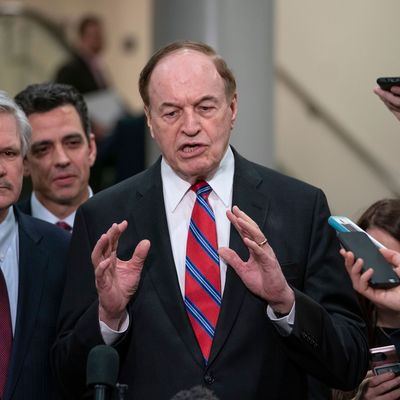
As widely noted at the time, the president’s State of the Union address contained absolutely nothing in the way of new developments regarding the congressional impasse over border-security funding. There were zero proposed concessions to any point of view other than Trump’s, and for that matter, no indication of what he might do (e.g., issue a national emergency declaration and start moving money around on his own) when the current short-term funding agreement runs out on February 15.
Absent any new input from the generator of the government shutdown, who seems to have decided the only thing that matters is looking tough in the eyes of his base, congressional appropriators appear to have shrugged and shuffled back to the negotiating table, working toward an agreement that might turn out to be a waste of paper, as Roll Call reports:
House Speaker Nancy Pelosi told reporters Tuesday night after President Donald Trump’s State of the Union address and again on Wednesday that she planned to let the conferees work their will …
“Left to their own devices I think they can have an agreement on time by Friday,” the California Democrat said Wednesday. “If they have a bipartisan agreement, I will support it.” She said she communicated as much to Shelby earlier in the week, and to Vice President Mike Pence on Tuesday night.
That puts Pelosi in the same camp as Senate Majority Leader Mitch McConnell, another veteran Senate Appropriations member who for years sat across the table from Pelosi hammering out details of the annual foreign assistance budget. McConnell said Tuesday he planned to let Shelby come up with a package, and then “we’ll hope the president finds it worth signing.”
Politico reports some encouraging talk from a key Republican negotiator:
“I would say we’ve got a much better chance today than we had Monday to reach some kind of resolution on this,” Senate Appropriations Chairman Richard Shelby (R-Ala.) said after the briefing. “We’re dealing in substance now. Something we haven’t done before…”
Shelby said negotiators will “know in the next few days” whether a bipartisan compromise on border security is achievable.
We should hope they’d know pretty soon, since it’s just nine days before another government shutdown looms. But in reality, time and party differences aren’t the problem here. Congressional appropriators slice and dice and wheel and deal as naturally as a fish swims. Of course they can reach an agreement. The question is whether Republicans once against get shivved in the back by the White House, as happened back in December, when the president, under intolerable criticism from right-wing gabbers, abandoned his support for a compromise funding bill — you know, like the bill negotiators are working on now.
Perhaps this time around the White House will at least let its congressional allies know what Trump plans to do before they make too many public noises about a deal. If, for example, Trump plans to issue an emergency declaration, that takes the central conflict issue out of the hands of Congress and into the courts, where Trump’s efforts to commandeer dollars for his wall may rise or fall. Then appropriators can appropriate, and life in Washington can return to normal.
For the time being, though, all the hopeful talk of a deal amounts to the belief that if they had some ham, negotiators could make a ham sandwich, if only they had some bread. It’s really all up to Trump.






























